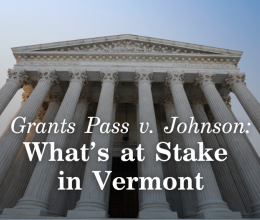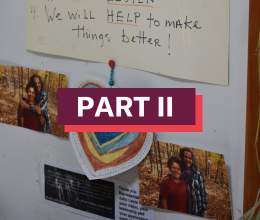Read the Press Release
Vermonters have seen countless examples of police abuse in recent years. Excessive force, racial profiling, and hyper-aggressive enforcement – these aren’t just problems in “big cities” and other states. All too often, Vermont police escalate routine encounters, overreaching and abusing their authority in ways that threaten the rights and safety of all of us. Take the case of ACLU client Gregory Bombard, for example.
In 2018, Vermont State Trooper Jay Riggen stopped Gregory Bombard’s car – not because of a traffic violation, but because he believed Bombard had given him “the finger.” Bombard denied making any such gesture but was detained and harassed by Riggen for several minutes. He was finally released, at which point Bombard did in fact display his middle finger, as was his right (we’ll come back to that point in a moment).
Riggen then stopped Bombard again and arrested him for disorderly conduct. Bombard’s car was towed, he was briefly jailed, and it was almost a year before the charge was finally dismissed.
This week, we filed a lawsuit on behalf of Gregory Bombard for violation of his constitutional rights, including his right to be free from unreasonable seizure and false arrest, as well as his right to give “the finger” to protest the actions of police, clearly a constitutionally protected act of free expression.
Gregory Bombard’s experience is yet another example of the many ways in which Vermonters are overpoliced. A recent study of Vermont traffic stops found that, in 2019, police in Vermont stopped residents at a rate nearly four times higher than the national average and Vermont State Police stops have increased nearly 50% since 2015. The study also showed that Black and Hispanic drivers continue to be stopped and searched at higher rates, despite being less likely than white drivers to be found with contraband.
As part of a nationwide movement for police reform, we’ve been calling on Vermont lawmakers to reimagine policing. A big part of that means preventing unnecessary police interactions, like the one experienced by our client and so many other Vermonters. It also means limiting the broad powers of police in our communities – including police discretion to cite or arrest people for petty offenses like “disorderly conduct,” police involvement in mental health crises, and police authority to conduct “consent”-based searches.
In the meantime, we are grateful to Gregory Bombard for fighting to vindicate his constitutional rights and the rights of all Vermonters. You can learn more about this case here.


